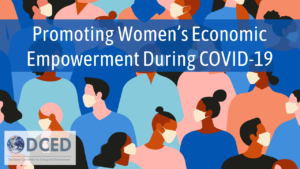 Women have suffered disproportionately from the economic fallout of COVID-19, shows a new policy brief by the DCED Working Group on Women’s Economic Empowerment. Although donors adjusted operations and issued new support in response, they should also adopt and promote a multidimensional and intersectional approach to Women Economic Empowerment.
Women have suffered disproportionately from the economic fallout of COVID-19, shows a new policy brief by the DCED Working Group on Women’s Economic Empowerment. Although donors adjusted operations and issued new support in response, they should also adopt and promote a multidimensional and intersectional approach to Women Economic Empowerment.
Increased unpaid care work, limited access to education and jobs, an increase in sexual violence, reduced income and savings – a large and growing body of evidence shows how hard the Covid-19 pandemic hit women and girls in developing regions. To put that in numbers:
- The employment loss measured in working hours for women globally was 5.0 percent in 2020, versus 3.9 percent for men.1
- Women-owned enterprises are more likely to have closed since the start of the pandemic than male-owned enterprises.2
- With closed schools and childcare centres during lockdowns, households’ unpaid care and domestic workloads have intensified. In developing regions, working age women (15–64) are estimated to have provided an average of 217 additional hours of unpaid childcare in 2020, compared to just 70 additional hours for men.3
- Since March 2020, an estimated 90 percent of the world’s school-age children have had their education disrupted due to the pandemic.4 Girls are less likely than boys to return to primary and secondary education post-crisis. Using longitudinal data from Ebola, Malala Fund estimates that an additional 20 million secondary school-aged girls in developing countries will be out of school post-COVID.5
Donors responded, but they still need to ramp up support
Donors and development organizations responded to the gender impacts of the pandemic, shows the new DCED report. Many adjusted their programming, for example, by repurposing activities or digitizing programs. Many also provided new financial support. Donors began collecting more gender-disaggregated data, stepped up their monitoring and evaluation, and engaged in research and data sharing.
However, we have not yet seen the mobilization of donor attention and resources that is urgently needed to address the gender impacts of the pandemic head on, including its impacts on Women Economic Empowerment. Just 42 percent of all global government responses to Covid-19 are gender-sensitive.6 “Donors and development agencies need to ramp up support for WEE and ensure that a gender-transformative approach is integrated in all COVID-19 response and recovery efforts”, the report concludes. Gender equality and especially gender transformative
approaches should be integrated in even more in programmes in the future.
Sources
- https://www.ilo.org/global/topics/coronavirus/impacts-and-responses/WCMS_767028/lang–en/index.htm
- https://scontent-dus1-1.xx.fbcdn.net/v/t39.8562-6/10000000_375415437290846_4756927838159858489_n.pdf?_nc_cat=104&ccb=1-5&_nc_sid=ae5e01&_nc_ohc=cT53s42hCbsAX-m4cOg&_nc_ht=scontent-dus1-1.xx&oh=00_AT9f6PmSdwyHyM_amZCQYQOI0p0w1z6T1sABEzV33m7HzQ&oe=62006A5F
- https://www.cgdev.org/sites/default/files/global-childcare-workload-from-school-closures-covid.pdf
- https://www.hrw.org/report/2021/05/17/years-dont-wait-them/increased-inequalities-childrens-right-education-due-covid
- https://malala.org/newsroom/archive/malala-fund-releases-report-girls-education-covid-19
- https://www.undp.org/publications/covid-19-global-gender-response-tracker-fact-sheets
Claudia-Dominique Geiser / Jens-Peter Hiller

